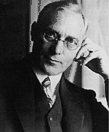 Max Gerson, M.D.was born in Wongrowitz, Germany (1881). He attended the universities of Breslau, Wuerzburg, Berlin, and Freiburg. Suffering from severe migraines, Dr. Gerson focused his initial experimentation with diet on preventing his headaches. One of Dr. Gerson’s patients discovered in the course of his treatment, that the “migraine diet” had cured his skin tuberculosis. This discovery led Gerson to further study the diet, and he went on to successfully treat many tuberculosis patients. His work eventually came to the attention of famed thoracic surgeon, Ferdinand Sauerbruch, M.D.
Max Gerson, M.D.was born in Wongrowitz, Germany (1881). He attended the universities of Breslau, Wuerzburg, Berlin, and Freiburg. Suffering from severe migraines, Dr. Gerson focused his initial experimentation with diet on preventing his headaches. One of Dr. Gerson’s patients discovered in the course of his treatment, that the “migraine diet” had cured his skin tuberculosis. This discovery led Gerson to further study the diet, and he went on to successfully treat many tuberculosis patients. His work eventually came to the attention of famed thoracic surgeon, Ferdinand Sauerbruch, M.D.
Under Sauerbruch’s supervision, Dr. Gerson established a special skin tuberculosis treatment program at the Munich University Hospital. In a carefully monitored clinical trial, 446 out of 450 skin tuberculosis patients treated with the Gerson diet recovered completely. Dr. Sauerbruch and Dr. Gerson simultaneously published articles in a dozen of the world’s leading medical journals, establishing the Gerson treatment as the first cure for skin tuberculosis.
At this time, Dr. Gerson attracted the friendship of Nobel prize winner Albert Schweitzer, M.D., by curing Schweitzer’s wife of lung tuberculosis after all conventional treatments had failed. Gerson and Schweitzer remained friends for life, and maintained regular correspondence. Dr. Schweitzer followed Gerson’s progress as the dietary therapy was successfully applied to heart disease, kidney failure, and finally – cancer. Schweitzer’s own Type II diabetes was cured by treatment with Gerson’s therapy.
In 1938, Dr. Gerson passed his boards and was licensed to practice in the state of New York. For twenty years, he treated hundreds of cancer patients who had been given up to die after all conventional treatments had failed.
In 1946, Gerson demonstrated recovered patients before the Pepper-Neely Congressional Subcommittee, during hearings on a bill to fund research into cancer treatment. Although only a few peer-reviewed journals were receptive to Gerson’s then “radical” idea that diet could effect health, he continued to publish articles on his therapy and case histories of healed patients.
In 1958, after thirty years of clinical experimentation, Gerson published A Cancer Therapy: Results of 50 Cases. This medical monograph details the theories, treatment, and results achieved by a great physician. Gerson died in 1959, eulogized by long-time friend, Albert Schweitzer M.D.: “…I see in him one of the most eminent geniuses in the history of medicine. Many of his basic ideas have been adopted without having his name connected with them. Yet, he has achieved more than seemed possible under adverse conditions. He leaves a legacy which commands attention and which will assure him his due place. Those whom he has cured will now attest to the truth of his ideas.”
http://www.gerson.org/GersonTherapy/mg.htm

